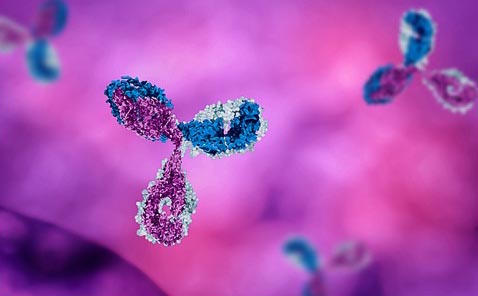New study reveals the role of autoantibodies in post-COVID-19 vaccination syndrome
Nikhil Prasad Fact checked by:Thailand Medical News Team Aug 03, 2024 1 year, 5 months, 3 weeks, 4 days, 16 hours, 39 minutes ago
COVID-19 News: The Challenge of Post-COVID-19 Vaccination Syndrome
The COVID-19 pandemic brought unprecedented challenges, and vaccines have played a crucial role in controlling the virus's spread. However, some individuals have reported persistent neurological symptoms following vaccination, a condition now referred to as post-COVID-19 Vaccination Syndrome (PCVS). This
COVID-19 News report delves into recent research that sheds light on the presence of autoantibodies in PCVS patients, offering new insights into this emerging health issue.
 New study reveals the role of autoantibodies in post-COVID-19 vaccination syndrome
What is PCVS?
New study reveals the role of autoantibodies in post-COVID-19 vaccination syndrome
What is PCVS?
Post-COVID-19 Vaccination Syndrome (PCVS) encompasses a range of neurological symptoms that appear after receiving a COVID-19 vaccine. These symptoms include paresthesia (a tingling or pricking sensation), neuropathic pain, fatigue, cognitive deficits, and headaches. Unlike Post-COVID-19 Syndrome (PCS), which occurs after a SARS-CoV-2 infection and primarily affects the central nervous system, PCVS predominantly impacts the peripheral nervous system.
The Study: Unveiling Autoantibodies
Researchers from Charité-Universitätsmedizin Berlin-Germany and several other prestigious institutions conducted a study to explore the presence and impact of autoantibodies in PCVS patients. The team, including Dr Friederike A. Arlt, Dr Ameli Breuer, and Dr Christiana Franke, aimed to understand the frequency and targets of these autoantibodies.
Methodology: Rigorous Analysis
The study involved 50 PCVS patients who developed neurological symptoms after receiving a COVID-19 vaccine and 35 vaccinated healthy controls. Researchers used various advanced techniques, including indirect immunofluorescence assays, ganglioside blots, and immunoprecipitation coupled to mass spectrometry (IP-MS), to detect and identify autoantibodies in the participants' sera.
Key Findings: Autoantibodies and Nervous System Structures
The study found a significantly higher frequency of autoantibodies against peripheral nervous system structures in PCVS patients compared to the healthy control group. Specifically, 18% of PCVS patients had these autoantibodies, while only 3% of the controls did. The autoantibodies targeted various structures within the peripheral nervous system, including axons, paranodes, Schmidt-Lanterman incisures (SLIs), and Schwann cell nuclei.
Detailed Observations
-Axonal Binding: Autoantibodies in some PCVS patients were found to bind specifically to axons, the long thread-like part of a nerve cell along which impulses are conducted.
-Paranodal Binding: Paranodes, regions adjacent to the nodes of Ranvier, were another target. Some patients exhibited narrow paranodal binding, while others showed broad paranodal binding.
-Schmidt-Lanterman I
ncisures: These are interruptions in the myelin sheath of nerve fibers, and some PCVS patients had autoantibodies targeting these regions.
-Schwann Cell Nuclei: A few patients had autoantibodies binding to the nuclei of Schwann cells, which play a critical role in the maintenance and regeneration of peripheral nerves.
Identification of Autoantibody Targets
Through immunoprecipitation coupled to mass spectrometry, researchers identified various subunits of neurofilaments and the DFS-70 protein as potential autoantibody targets. These findings suggest that autoantibodies against neurofilaments and Schwann cell nuclei could be relevant in PCVS patients.
Comparison with Healthy Controls
The control group showed minimal autoantibody presence, with only one healthy control serum exhibiting broad paranodal binding. This stark contrast underscores the potential role of these autoantibodies in PCVS.
Implications: Biomarker Potential and Diagnostic Challenges
The presence of autoantibodies in PCVS patients suggests that these antibodies could serve as biomarkers for diagnosing PCVS. However, further research is needed to understand their pathophysiological relevance fully. The study's findings also highlight the challenges in distinguishing PCVS from other conditions, including psychiatric or psychosomatic disorders.
Future Directions: More Research Needed
Given the study's limitations, including the single cross-sectional serum investigation and the variability in symptom onset among patients, more extensive research is required. Future studies should investigate patient sera before and after vaccination and conduct functional tests with patient-derived antibodies to elucidate the origin and impact of these autoantibodies.
Conclusion: Moving Forward with Caution
While the overall occurrence of PCVS remains rare compared to the total number of vaccinated individuals, understanding this condition is crucial for developing diagnostic criteria and treatment strategies. The study's findings provide a foundation for future research, which could lead to better management of PCVS and similar autoimmune phenomena.
The Takeaway
The discovery of autoantibodies in PCVS patients marks a significant step towards understanding this complex condition. The study, conducted by researchers from Charité-Universitätsmedizin Berlin and other institutions, offers valuable insights into the potential mechanisms underlying PCVS.
The study findings were published in the peer-reviewed journal: Frontiers in Immunology.
https://www.frontiersin.org/journals/immunology/articles/10.3389/fimmu.2024.1404800/full
For the latest
COVID-19 News, keep on logging to Thailand Medical News.
Read Also:
https://www.thailandmedical.news/news/the-role-of-autoantibodies-in-long-covid
https://www.thailandmedical.news/news/study-shows-insights-of-nuanced-interactions-between-autoantibodies-and-specific-covid-19-symptoms-with-anti-agtr1-antibodies-playing-a-key-role
